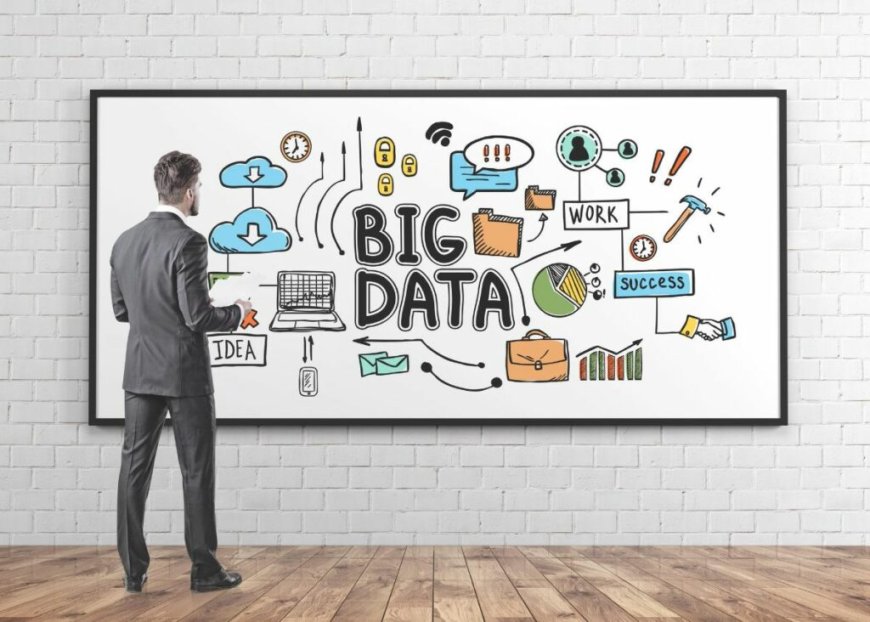Big Data and Its Role in Shaping Modern Businesses
Discover how big data is transforming modern businesses. Learn about its role in decision-making, customer experience, innovation, and more. Stay competitive with data-driven strategies.

Introduction
In today's fast-paced business world, data has become the new gold. Big data, in particular, is revolutionizing how companies operate, make decisions, and interact with customers. This article will dive deep into what big data is, its growing importance, and how it's transforming modern businesses. By the end, you'll understand why embracing big data is crucial for staying competitive in today's data-centric world.
What is Big Data?
Big data refers to extremely large and complex data sets that require innovative methods and technologies to store, process, and analyze. It's characterized by the five Vs:
-
Volume: The sheer amount of data generated every second.
-
Velocity: The speed at which data is created, collected, and processed.
-
Variety: The different types of data, including structured (databases), unstructured (social media posts), and semi-structured (JSON files).
-
Veracity: The quality and accuracy of the data.
-
Value: The insights and benefits derived from analyzing the data.
Big data comes from various sources like social media, IoT devices, and transactional data. Each source provides unique insights that can be harnessed to drive business growth.
The Role of Big Data in Modern Businesses
1. Enhancing Decision-Making
Big data enables businesses to make informed decisions based on real-time insights. Predictive analytics, for instance, helps companies forecast trends and customer behaviors. For example, a retailer can use big data to predict which products will be in high demand during the holiday season, allowing them to stock up accordingly.
2. Improving Customer Experience
Personalization is key to enhancing customer experience. Big data allows businesses to understand customer preferences and behaviors better. Netflix's recommendation engine is a prime example. By analyzing viewing habits, Netflix can suggest shows and movies that users are likely to enjoy. Similarly, Amazon uses big data to personalize the shopping experience, making it more convenient and enjoyable for customers.
3. Optimizing Operations
Big data can streamline supply chains and improve operational efficiency. Real-time monitoring and predictive maintenance help businesses avoid downtime and reduce costs. For example, a manufacturing company can use big data to predict when a machine is likely to fail, allowing for timely maintenance and minimizing disruptions.
4. Driving Innovation
Big data opens up new market opportunities and fuels innovation. By analyzing data, businesses can identify gaps in the market and develop new products or services. For instance, a healthcare company might use big data to develop personalized medicine, tailoring treatments to individual patients based on their genetic makeup.
Industries Shaped by Big Data
5. Healthcare
In healthcare, big data is used for predictive analytics to improve patient care. It plays a crucial role in drug discovery and personalized medicine. For example, big data can help identify patterns in patient data that might indicate the early stages of a disease, allowing for earlier intervention and better outcomes.
6. Retail
Retailers use big data for inventory management and demand forecasting. It also enhances customer loyalty programs. For instance, a retailer can use big data to understand which products are most popular and ensure they are always in stock. Additionally, loyalty programs can be tailored to individual customers based on their purchasing history.
7. Finance
In the finance sector, big data is essential for fraud detection and risk management. Algorithmic trading and credit scoring systems rely heavily on big data. For example, banks can use big data to detect unusual transactions that might indicate fraud, protecting both the bank and its customers.
8. Transportation and Logistics
Big data optimizes routes and manages fleets in the transportation and logistics industry. Real-time tracking improves delivery times. Companies like Uber and DHL use big data to optimize their operations, ensuring that packages and passengers arrive on time.
Challenges of Implementing Big Data
9. Data Privacy and Security Concerns
Ensuring data privacy and security is a significant challenge. Businesses must comply with regulations like GDPR and protect sensitive customer information. Failure to do so can result in hefty fines and loss of customer trust.
10. Managing Data Quality
Incomplete or inaccurate data can lead to poor decision-making. Data governance is crucial for maintaining data quality. Businesses need to implement robust data management practices to ensure the data they use is reliable.
11. High Implementation Costs
Acquiring the necessary tools and expertise for big data can be costly. However, there are strategies for small and medium businesses to adopt big data solutions without breaking the bank. For example, cloud-based big data platforms offer scalable and cost-effective solutions.
Future Trends in Big Data
The future of big data is exciting. Integration with AI and machine learning will enhance data analysis capabilities. Real-time data processing will become more prevalent, allowing businesses to react instantly to changing conditions. Additionally, there will be a growing emphasis on ethical data usage, ensuring that data is used responsibly and fairly.
Tips for Businesses Embracing Big Data
-
Identify Clear Goals: Know what you want to achieve with your data initiatives.
-
Choose the Right Tools: Select platforms that align with your goals and budget.
-
Train Employees: Ensure your team is equipped to work with big data.
-
Collaborate with Experts: Partner with data consultants to maximize your big data efforts.
Conclusion
Big data is transforming businesses across all industries. From enhancing decision-making to improving customer experience and driving innovation, the benefits are immense. Embracing a data-driven strategy is essential for staying competitive in today's fast-paced business environment.
Frequently Asked Questions (FAQs)
1. What are the main benefits of big data for businesses?
Big data helps businesses make informed decisions, improve customer experience, optimize operations, and drive innovation.
2. How can small businesses leverage big data effectively?
Small businesses can use cloud-based big data platforms, which are scalable and cost-effective. They can also collaborate with data experts to maximize their big data efforts.
3. What are the best tools for big data analysis?
Popular big data tools include Hadoop, Spark, and cloud-based platforms like Google BigQuery and Amazon Redshift.
4. How does big data contribute to innovation?
Big data helps identify new market opportunities and develop data-driven products and services.
5. What are the ethical concerns associated with big data usage?
Ethical concerns include data privacy, security, and ensuring that data is used responsibly and fairly.
What's Your Reaction?








































